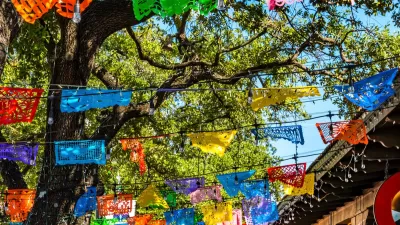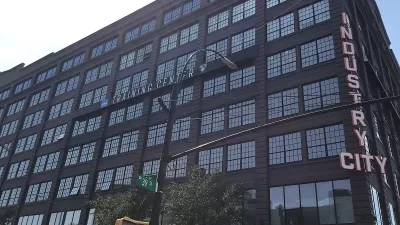After a decade of phenomenal growth and transformation, a survey of D.C. residents reveals widespread agreement on neighborhood improvement, but also concern that the changes are only benefiting the city's affluent residents.
A recent Washington Post poll finds mixed views of the impact of redevelopment among the city's residents, reports Marc Fisher. "Across the District, residents see many neighborhoods thriving as they haven’t in decades, but depending on their income and race, Washingtonians often see that boom benefiting different groups. What many residents do agree on is that the city’s mayor and other elected officials have little ability to ensure that the new prosperity will lift all boats."
While many residents view the city government as unable or unwilling to protect vulnerable populations from rising housing prices and cultural transformation, some see an ulterior motive. "Michelle McKenzie, who opened a storefront church that has drawn black congregants in an increasingly white part of town, says the demographic shift is the result of The Plan, a decades-old staple of District folklore — a purported drive by powerful white interests to reclaim the city from its long-standing black majority," writes Fisher. "Some mayors supported The Plan, McKenzie says, and others fought it but without making much difference. 'The Plan is The Plan,' she says."
FULL STORY: Most in D.C. say neighborhoods are better, but many say redevelopment helps the rich more

Planetizen Federal Action Tracker
A weekly monitor of how Trump’s orders and actions are impacting planners and planning in America.

Maui's Vacation Rental Debate Turns Ugly
Verbal attacks, misinformation campaigns and fistfights plague a high-stakes debate to convert thousands of vacation rentals into long-term housing.

Restaurant Patios Were a Pandemic Win — Why Were They so Hard to Keep?
Social distancing requirements and changes in travel patterns prompted cities to pilot new uses for street and sidewalk space. Then it got complicated.

In California Battle of Housing vs. Environment, Housing Just Won
A new state law significantly limits the power of CEQA, an environmental review law that served as a powerful tool for blocking new development.

Boulder Eliminates Parking Minimums Citywide
Officials estimate the cost of building a single underground parking space at up to $100,000.

Orange County, Florida Adopts Largest US “Sprawl Repair” Code
The ‘Orange Code’ seeks to rectify decades of sprawl-inducing, car-oriented development.
Urban Design for Planners 1: Software Tools
This six-course series explores essential urban design concepts using open source software and equips planners with the tools they need to participate fully in the urban design process.
Planning for Universal Design
Learn the tools for implementing Universal Design in planning regulations.
Heyer Gruel & Associates PA
JM Goldson LLC
Custer County Colorado
City of Camden Redevelopment Agency
City of Astoria
Transportation Research & Education Center (TREC) at Portland State University
Jefferson Parish Government
Camden Redevelopment Agency
City of Claremont





























